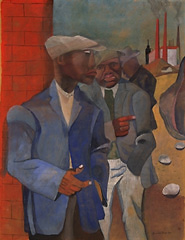Curriculum Materials: Art in America
|
|
Image 22 Romare Bearden Questions: |
Factory Workers
Fortune magazine commissioned Bearden's GOUACHE painting Factory Workers as the frontispiece for a June 1942 article on the experience of black workers during World War II. The article condemned the cost of racial discrimination, especially during wartime, and advocated integration as both a social and financial necessity in the American workplace.
Factory Workers exemplifies Bearden's early social-realist STYLE. Dominating the FOREGROUND are the monumental figures of two men standing beside a red brick structure. Immediately behind them is a shadowy third figure and, further back, a smoky factory complex. To the right are three cartoonlike rocks and an abstract form resembling the rear of a car. One man points, while the other looks at something outside of the picture. Only the distant factory and a smudge of orange dirt on the smaller man's striped pants identify them as factory workers. Rather than depicting these men as dehumanized or machinelike, Bearden showed them as individuals with distinct personalities and styles.
Reminiscent of his political cartoon style,
Bearden used strong contour lines
and exaggerated features to express the individual
characters and moods of these men. He omitted descriptive
details that would interrupt the flow of his lines and the
solidity of his forms. Instead he subtly modulated color and
value to create richly varied surfaces, as in the mens'
jackets and faces. Like the rocks and car, the factory is
abstract. Of all the images in the painting, only it is
reduced to basic
GEOMETRIC shapes. In
contrast to the ORGANIC
forms and subdued blues, grays, and browns of the men, the
geometric regularity and the bright red, white, and black of
the factory emphasize its dehumanizing nature.
|
|
